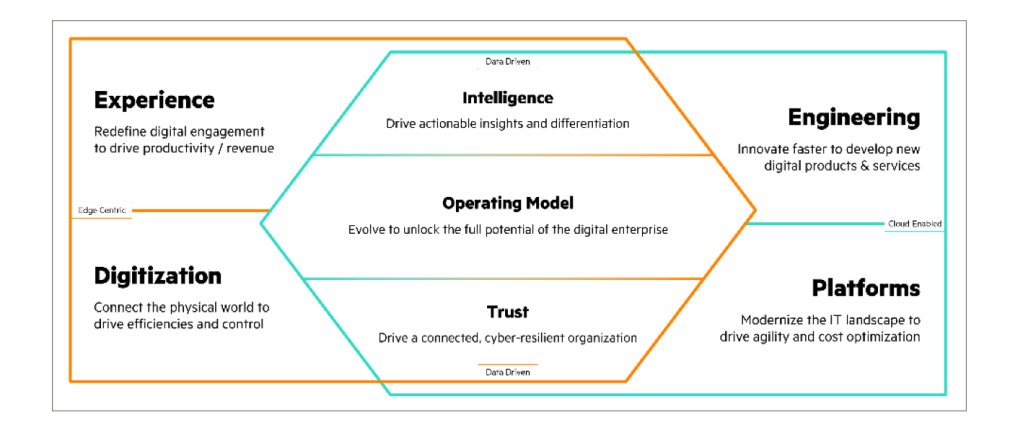As a technology company you can imagine how easy it is to think of data-first modernization as a technology challenge. Data fabric, data cleansing and tagging, data models, containers, inference at the edge – cloud-enabled platforms are all “go-to” conversation points. While the instinctive response to the issue of being “data-driven” can focus on “what is it?” and “how to do it?”, it’s important to step back from the noise and structure your thoughts about “why” data-first? Being crystal clear about “why” will provide the vision for the use case you can seek to develop; it will force you to derive a compelling value proposition and identify the KPIs that will guide and measure success.
In a previous article I introduced a framework called the HPE Digital Journey Map (DJM) precisely to guide our customers as they explore the “why.” The DJM provides a reference point to examine four key business-driven agendas associated with how to navigate a data-first modernization. The first two expose the value of data applied at the digital edge.

The Experience Agenda
With nearly 6 billion people connected to the Internet in 2022, the opportunity to provide value through digital engagement channels remains top of mind. This is especially true for those companies that have experienced the impact of the global pandemic, and how that stress-tested their existing business model.
Digitally resilient business models are becoming mainstream concepts that thrive despite global disruptions. As organizations around the world pivot to digital channels for value exchange, the key differentiator will be the experience. Given this context, the experience agenda is a breeding ground for new use cases fuelled by data. Areas such as hyper-personalization, behavioural analytics, and predictive recommendations are good examples of where data-first modernization can be put to work. KPIs such as customer loyalty and satisfaction (net promoter scores), citizen engagement, recurring purchases, digital revenue streams, or even productivity (if aimed at internal personas) typically emerge as quantitative ways to measure your effectiveness under the umbrella of this agenda.
The Digitization Agenda
With an exponentially bigger scale, nearly 75 billion Internet of Things (IoT) devices will be connected by 2025. The scale of this opportunity unlocks the ability to blur the physical and digital boundary. Often associated with initiatives that seek to provide a “digital twin” of a physical reality, organizations are increasingly able to sense and instrument the world in real time.
Value in this agenda is heavily linked to the physical world. Connect a stadium and you can deliver enhanced fan experiences; an airport and deliver passenger experiences. Connect manufacturing equipment and you can drive down Overall Equipment Effectiveness (OEE), improve quality, and increase throughput. Connect a city and you can bring smiles to the faces of your citizens as they get connected to city-wide services more seamlessly – just like we are helping to deliver in Dubai.
Connect car sensors and you can start to push on the frontier of autonomous driving just like we are doing with Zenseact in Sweden. Let’s also not forget smarter working in intelligent spaces, creating efficient and beneficial employee experiences. But most of the effort still focuses on what differentiates you. In other words, your edge is unique, so too is the potential you can unlock to create and exchange new digital value.
Being data-first equips organisations to mine these new sources of data at the edge. It requires an agility that is fuelled by being cloud-enabled, and there are two clear cloud agendas.
The Platforms Agenda
Establishing a digital platform is a foundational element to exploit and potentially monetize data. Cloud-enabled architectures are the de facto way forward due to their inherent ability to scale dynamically. Organizations can view the platforms agenda through two basic categories depending on how “elevated” the platform is in creating value.
At the more basic level, a platform can simply provide a collection of business and/or technology capabilities that other products or services consume to deliver their own business capabilities. Think of this as compute, storage, and networking as a service. At the highest level, platforms enable a “platform business model.” This is key in understanding the scope and breadth of the platform agenda. Initiatives inside this agenda can seek to establish a foundational capability for others to use, or it can in fact become the basis of the business.
Think of companies like Facebook and Netflix. Their digital platform is what their business model is based on. HPE has recently announced several key uplifts and improvements to our own digital business platform, with unified operating experience, new cloud services, and availability of HPE GreenLake in the online marketplaces of several leading distributors. As organizations seek to exploit a data-first modernization approach, establishing how platforms will contribute to the ambition will give clarity and definition to the purpose.
The Engineering Agenda
As vital as the platform agenda is in navigating a data-first modernization approach, any value must be engineered before it can be brought to market. Once in market, that engineering agenda will set the tone for how rapidly improvements, new features, and continuous innovation can be applied to the experience. This agenda has seen tremendous innovation over the last decade. We’ve worked with customers as they shift their engineering culture towards a more agile approach, integrating developers and operations better together (DevOps), and shifted towards cloud-native development practices.
The engineering agenda provides the collective home for these initiatives. All of them center around the basic goal of speeding up time to value and reducing friction in the innovation cycle. Increasingly critical to this engineering agenda is how these engineering teams can leverage data services inside the organization to help improve and differentiate the digital experience. On-demand access to deep learning services that allow engineering teams to exploit these new insights and embed them in data-driven outcomes will be critical to cross the data-first divide we see opening across organizations. For example, if you are a bank developing hyper-personalized offers through your digital banking app, your engineering team requires access to customer insights (spending and saving patterns) that you gain by transacting with them through a digital channel. Data, and more specifically insights, will be the frontier for engineering the next generation of digital outcomes.
These key business-driven agendas of experience, digitization, platforms, and engineering offer organizations a simple map to lay out their data-first modernization efforts, but there are also a few foundational agendas that should also be considered. Mining data for intelligence will continue to push areas like artificial intelligence (AI) into mainstream adoption. Democratizing access to services like high-performance compute (HPC) is a core HPE prediction. Establishing trust with data will be critical if your customers or citizens are willing to engage and advocate for your digital offering. Trust will most certainly require organizations to elevate beyond simple regulatory compliance, into areas like transparency and ethical dimensions.
HPE has itself recently published our own list of ethical AI principles precisely to help establish and build trust with our customers and our ecosystem. And make no mistake, if you are not looking to evolve your operating model so that the value of the technology you deploy can truly unlock your full potential, then you will never scale value across your organization.
If you’d like to understand how our Digital Journey Map can help you figure out the “why” behind a data-first modernization effort in your organization, then please reach out to us at HPE and ask to speak to a Digital Next Advisor. They’ll take it from there.
____________________________________
About Craig Partridge

Craig Partridge is the worldwide senior director for HPE Pointnext’s Digital Advisory & Transformation practice. The practice focuses on helping customers explore the opportunities presented by the digital era, providing them with a strategic framework through which the value of new digital initiatives can be realized. It helps customers link IT and the business desire to use technology as a strategic asset to achieve new levels of productivity and shows organizations how technology acquisitions can play a major role in helping to reshape and redefine the underlying value proposition of their business model.
Read More from This Article: Every Data-first Modernization Strategy Should Start with “Why?”
Source: News

